Disability-inclusive business models for an enabling environment
Disability-inclusive business models for an enabling environment
วันที่นำเข้าข้อมูล 14 ก.พ. 2566
Disability-inclusive business models for an enabling environment
Piroon Laismit
I have led many groups of visitors to our “chocolate factory” run entirely by persons with disabilities. The expressions of awe and amazement on the faces of my guests never fail to warm my heart. Enter our training centre for chocolate making and you will see to your left, visually impaired staff, meticulously wrapping chocolate bars with high precision, due to their heightened sense of touch and space. Turn to your right and you will see hearing impaired employees, stirring and pouring different chocolate mixtures into chocolate molds, monitoring these molds while they bake in the oven, and then taking them out of the oven for further processing. Every time I observe them busy at work while explaining to my guests the different steps involved in chocolate making, I always feel proud, not only of their achievements but also how they continue to inspire others. Every branch of 60+ Plus Bakery and Café was established with the aim to provide a space for training persons with disabilities, and to serve as a model for coffee shops, or restaurants, successfully run by persons with disabilities.
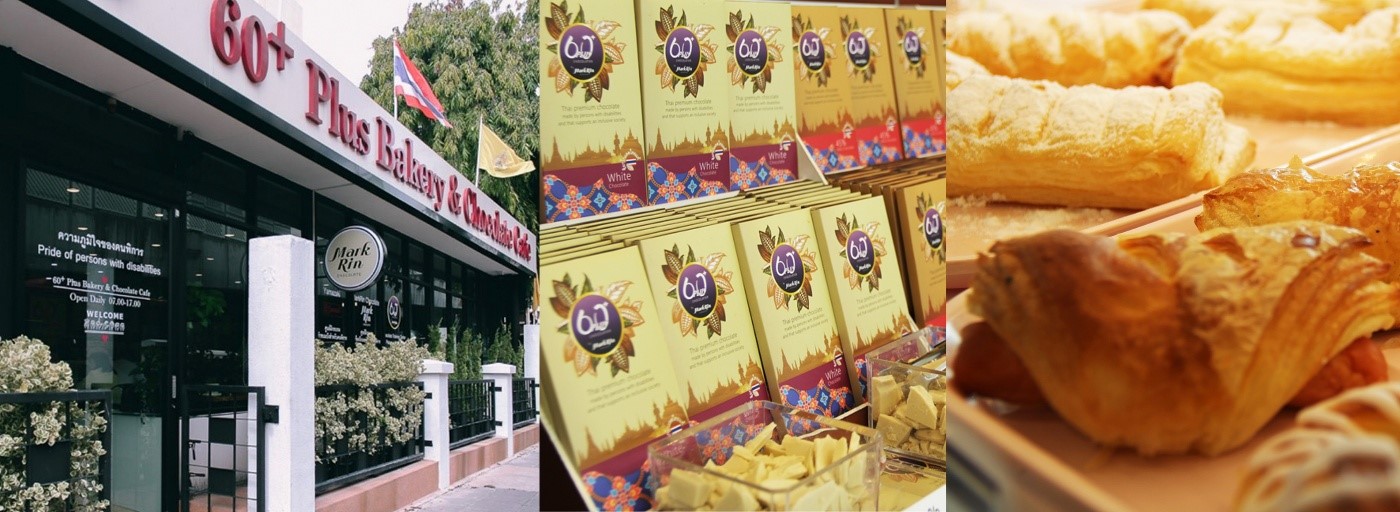
60+ Plus Bakery & Chocolate Café and products Source: APCD 60+ Plus Bakery & Café Facebook page
Over the years, I have seen the power and impact of coming together to create opportunities for people in society – opportunities that allow everyone to realize their full potential, and to be able to live independently with dignity. This is our aspiration at the Asia-Pacific Development Centre on Disability (APCD) when we design training courses and brainstorm career opportunities for persons with disabilities, mostly persons who are visually or hearing impaired, and autistic people. We have demonstrated that they are fully capable to contribute to the food business with our 60+ Plus Bakery and Café staffed and run entirely by such persons. The Café in particular, together with our “chocolate factory,” is a success story that I am always pleased to share with others and one that I have been personally committed to.
60+ Plus Bakery and Café by Yamazaki is a collaborative project between the Ministry of Social Development and Human Security of Thailand, the Embassy of Japan, Thai-Yamazaki Co. Ltd, and APCD. It is a project under the royal patronage of HRH Princess Maha Chakri Sirindhorn, established to commemorate HRH’s 60th birthday anniversary in 2015. In a very short time after its establishment and due to its immense success, the Café has expanded to include a branch at the Royal Government House and a restaurant run and serviced entirely by persons with disabilities.
Most recently in 2019, we had the honour to produce chocolate for world leaders during Thailand’s ASEAN Chairmanship that year and Thailand’s APEC Host Economy Year in 2022. It was a special opportunity to showcase the potential and talent of persons with disabilities to policy makers worldwide and a great source of pride for the men and women behind 60 Plus Café. My only hope is that with each new project and activity, their work will continue to inspire others to see beyond our limitations and to contribute whatever they can to society.
The Importance of a Disability Enabling and Disability Inclusive Future
As a regional development centre on disability, we strive to communicate the importance and necessity of working towards a disability enabling and disability inclusive future.
Since the 1970s, it was estimated that 10% of the world’s population was disabled. Some 40 years later in 2011, a first-ever joint report on disability produced by the World Health Organization (WHO) and the World Bank (WB) put that number at 15%, or approximately one billion people who were living with some form of disability. By the end of 2022, this figure had increased to 1.3 billion. In Thailand currently, 3.19% of the population, or roughly 2.1 million people, live with some form of disability.
One conclusion that can be drawn from these statistics is that disability is a fact and reality of life. Whether due to an increase in chronic diseases or ageing populations or sadly, war and conflict, disability is not something we can ‘eradicate’. Another conclusion is that the percentage of persons living with some forms of disability is not small and rather a number that must prompt us to action.
And this action must come from having the right attitudes towards and understanding of persons with disabilities. We must continue to find ways to enable and empower persons with disabilities, to live independently and contribute to their communities. This is valuable not only for the disabled population themselves, but for society as a whole, in reducing inequalities that prevent us from reaching our full potential.
Thailand’s Journey in Creating an Enabling Environment: From Social Welfare to Development Cooperation
In Thailand, work on creating an enabling environment for persons with disabilities started well before 2015 and the establishment of the 60+ Plus Bakery and Café by Yamazaki. In fact, it began in earnest decades ago in 1954, when the Foundation for the Welfare of the Disabled was established under the royal patronage of HRH the Princess Mother (HRH Princess Somdet Phra Srinakarindra Boromarajajonani). This was soon followed in 1961 by the establishment of a service center dedicated for children and a school for disabled people, “Sri Sangwan School”.
Over the following decades, an expanding network of foundations and organizations with missions to support people with disabilities were either set up or came under royal patronage in Thailand. The Foundation for the Blind and the Foundation for the Deaf in Thailand came under the royal patronage of the HM Queen Sirikit in 1959 and 1964 respectively, the Christian Foundation for the Blind received patronage by HM King Bhumibol in 1978, and the Thailand-Caulfield Foundation for the Blind (TCFB) came under the patronage of HRH Princess Maha Chakri Sirindhorn in 1980.
In my opinion, what was so distinct and pivotal about the royal patronage behind these foundations was that it gave these organizations much-needed publicity and support, improving access to critical funding and collaboration with other agencies. This, in turn improved ‘access’ for people with disabilities to public infrastructure and social services. It was the spark that ignited the engine behind a robust machinery that moved vital work forward in this area.
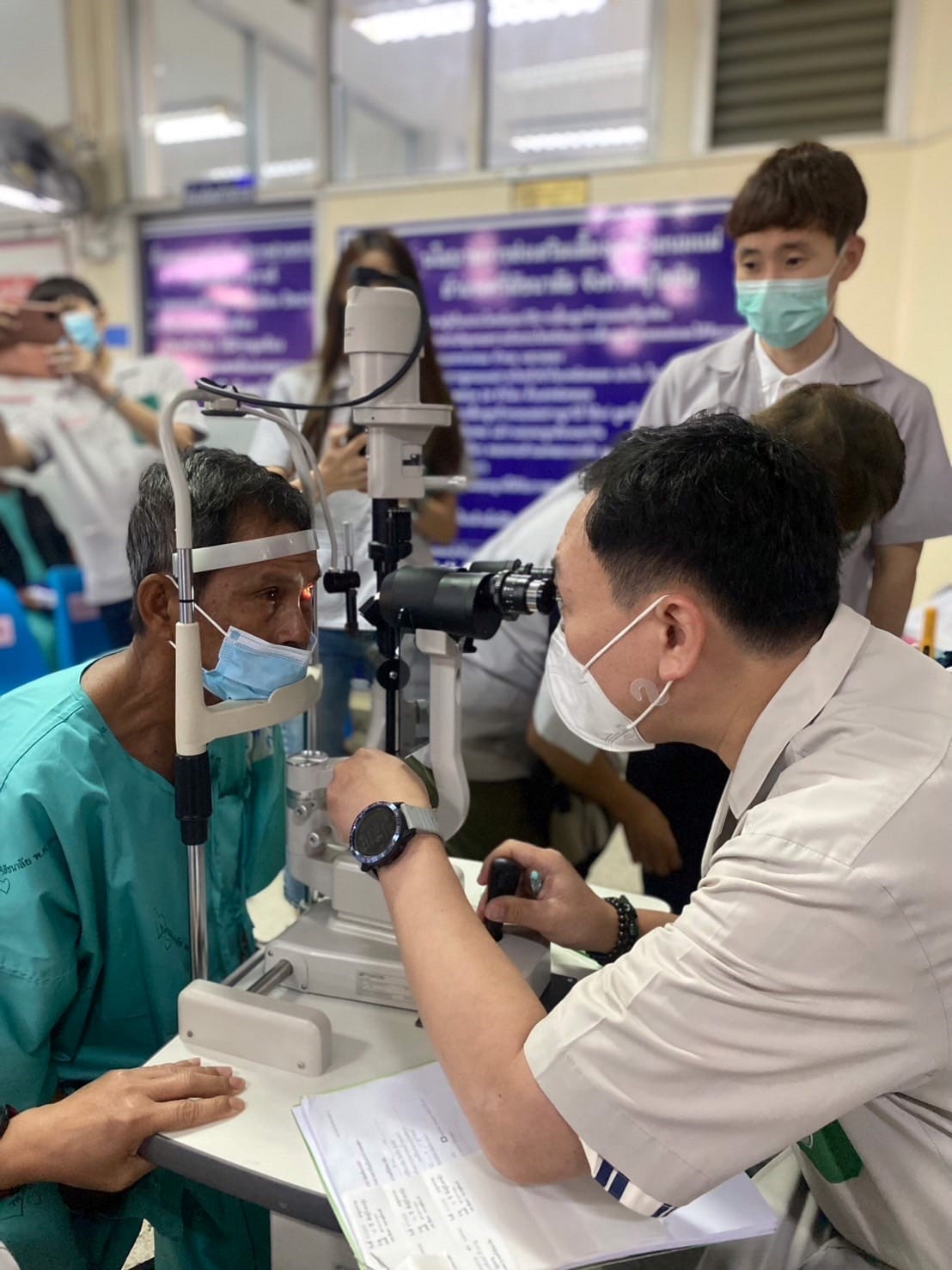
Source: Princess Mother’s Medical Volunteers Facebook page
As these foundations became more established in providing support to the disabled population in Thailand, some even extended outreach to other countries, especially developing countries in Africa and the South Pacific – adding positive momentum to Thailand’s development cooperation. Deserving particular mention is the Prostheses Foundation of HRH the Princess Mother. Set up officially in 1992, it initially worked with the Princess Mother’s Medical Volunteers (PMMV), whose mobile units of doctors and nurses have been in operation since 1969 to reach out to the sick and disabled in remote areas. From the outset, the Foundation focused on using locally-sourced materials for the production of prosthetic legs to reduce costs, based on the principle of self-sufficiency. Over the years and through the support and status lent by the royal patronage, the Foundation was able to collaborate widely with academia and the private sector in the comprehensive production, design, distribution and practical application of these artificial devices.
Towards Sustainable Development through Training and Knowledge Sharing
In 2007, the Prostheses Foundation started projects with community hospitals to offer all-in-one service for prosthetics wearers, including repairs, refitting of spare parts and training for prosthetics production. It was at this point that the knowledge-sharing took on an international dimension, with training extended to Vietnam, Papua New Guinea and Indonesia. A few years later, the Thailand International Cooperation Agency (TICA) initiated cooperation with Burundi and Senegal. By then, the Prostheses Foundation had already produced prosthetic legs for over 3,000 disabled persons, and become among the most prolific in Southeast Asia.
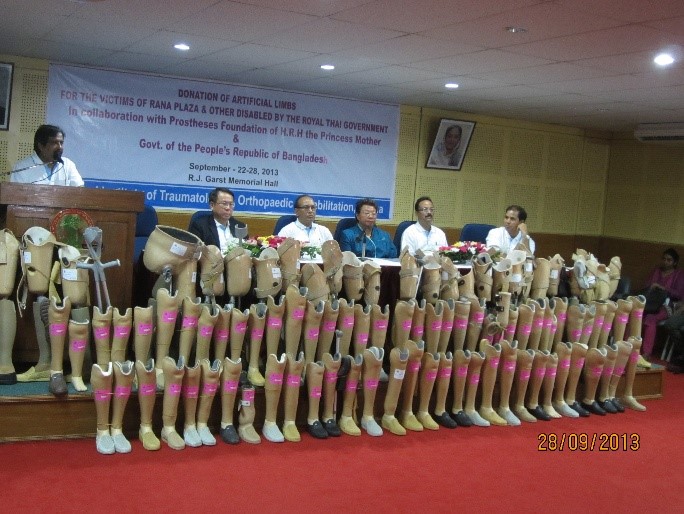 |
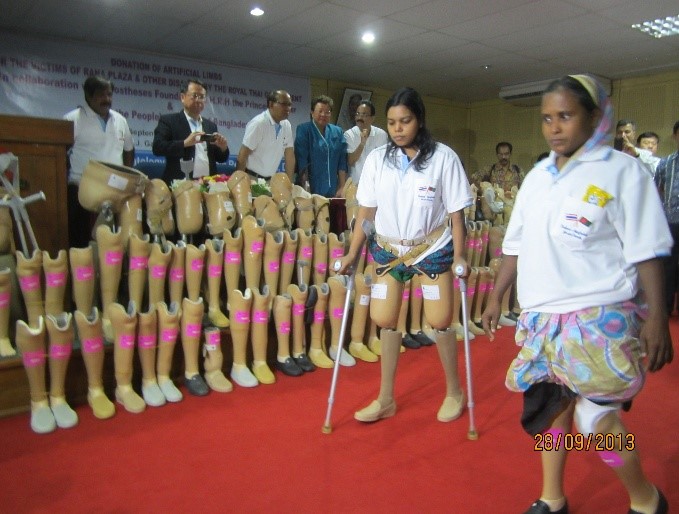 |
Source: TICA, Ministry of Foreign Affairs
On 28 September 2013, I had the opportunity to attend a donation ceremony for artificial limbs at the R.J. Grast Memorial Hall in Dhaka, Bangladesh, and to witness the life changing impact that they had with my own eyes. The donation was made upon the request of the Prime Minister of Bangladesh, whereby the Royal Thai Government, represented by TICA, in collaboration with the Prostheses Foundation of HRH the Princess Mother, donated one hundred artificial limbs to victims of the collapse of the Rana Plaza building in Dhaka, which housed five garment factories. Its collapse on 24 April 2013 killed at least 1,132 people and injured more than 2,500 workers. Our donation of artificial limbs from Thailand gave these workers in Bangladesh a new life and hope.
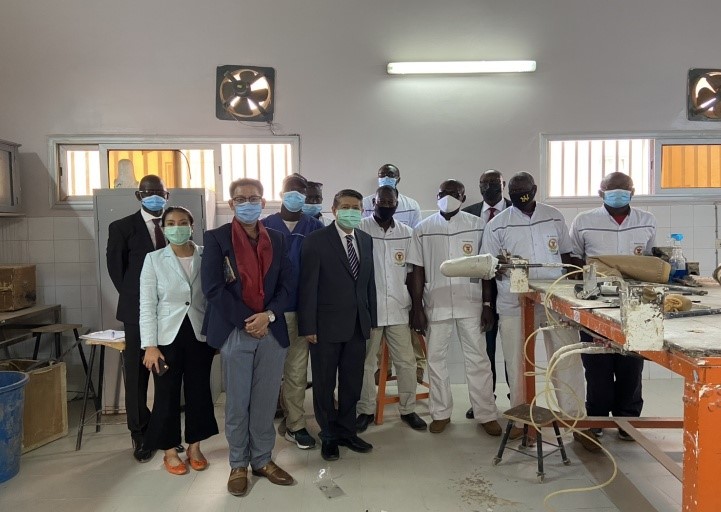
Thailand-Senegal cooperation on prosthetic services Source: Ministry of Foreign Affairs website
In Africa, the Royal Thai Embassy in Dakar, in collaboration with TICA, extended the expertise of the Prostheses Foundation to Burundi and Senegal by creating regular exchanges, and providing training on the production and management of prosthetics-related services. This collaboration also served to boost bilateral relations, with Thailand helping to set up a prostheses centre at a military hospital in Dakar. Officials from Senegal and Burundi also visited Thailand for study visits and further training.
In 2016, the Prostheses Foundation found exciting new collaborators. This time they were leading companies in the fields of material science and design. Dow Thailand Group, SCG Chemicals and Rubber Soul Company added innovative value by providing specialty urethane, polypropylene, elastomers and ergonomic design for better comfort and durability. The Foundation had indeed come a long way – from gaining royal patronage to assist the disabled in Thailand’s remote countryside, to offering comprehensive learning support to communities and villages in other countries.
Institutionalising Disability Inclusiveness
Efforts to improve the welfare of people with disabilities require constant attention and commitment. There is a need for an established infrastructure of public agencies, foundations, and private sector collaboration to sustain projects. And this collaboration, as we have seen in this space, does not need to be limited domestically. Rooted in the philosophy of self-sufficiency and the principle of sustainable development, the various Foundations in Thailand whose missions are to empower people with disabilities are now all operating with a vision towards self-reliance, holistic learning, and partnership with the private sector on disability-inclusive businesses, as well as development cooperation with other countries.
We have to recognize that disability, after all, is not inability. Rather, persons with disabilities are differently abled with their own set of unique strengths. They can be empowered through inclusive policies and society will benefit as a result.
Let me end here with a favorite quote of mine, that I always come back to, from the Late King Bhumibol the Great, which he uttered in his remarks at the Foundation for the Welfare of the Disabled under the Royal Patronage of HRH the Princess Mother on 22 March 1984: “Helping people with disabilities is a very important task…because they did not wish to be disabled, but would rather be able to help themselves… So, it is our task, our responsibility to ensure our policies enable them to help themselves, so that they can contribute to society”.
* * * * *
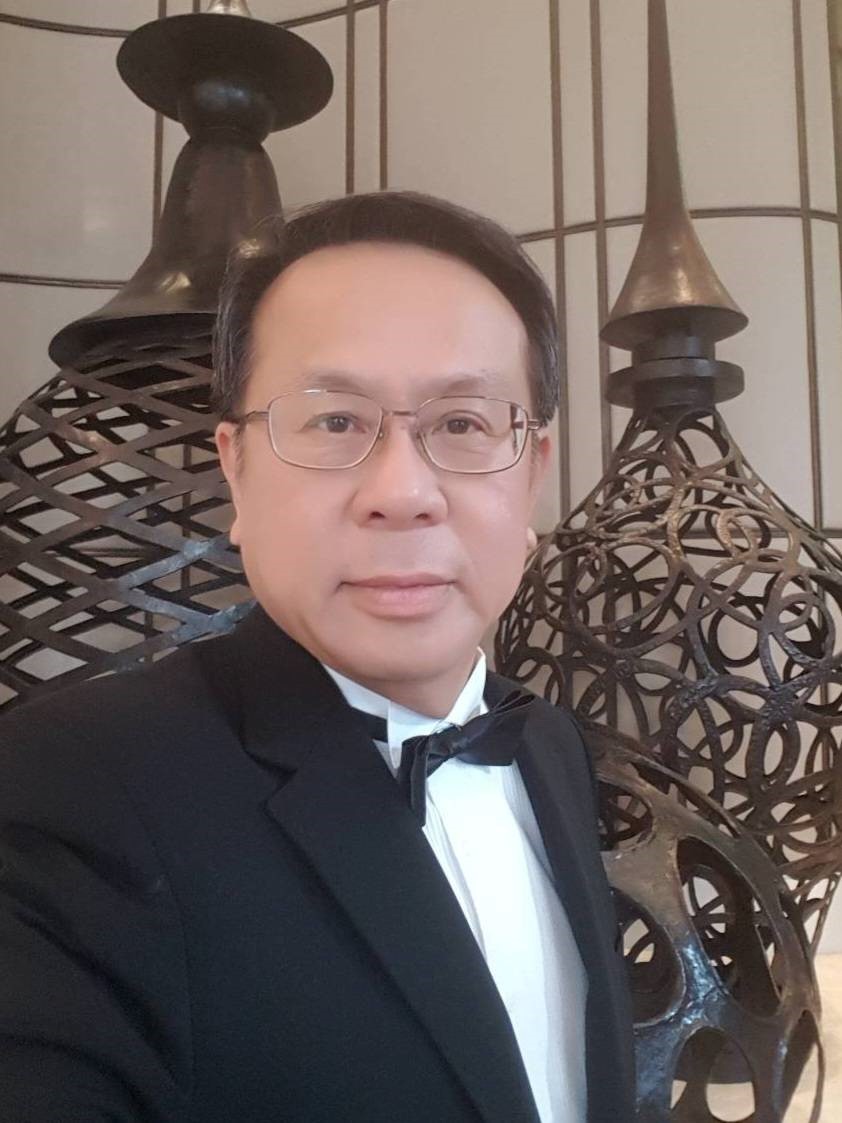 |
Mr. Piroon Laismit is the Asia-Pacific Centre on Disability (APCD) Executive Director and has extensive experience on the empowerment of persons with disabilities through capacity building programs. Before joining the APCD, Mr. Laismit headed Thailand’s development cooperation projects as the Director-General of the Thailand International Cooperation Agency (TICA), Ministry of Foreign Affairs, and has also served as Ambassador of Thailand to the State of Qatar. |
Royal Thai Embassy in New Delhi
เวลาทำการ : จันทร์-ศุกร์ 09:00 - 17:00 น. (ยกเว้นวันหยุดราชการ)
หมายเลขฉุกเฉินสำหรับชาวไทย +๙๑ ๙๕๙๙๓ ๒๑๔๘๔ (สถานเอกอัครราชทูตฯ ขอสงวนสิทธิไม่ตอบคำถามเกี่ยวกับประเด็นที่ไม่ใช่เรื่องฉุกเฉินที่เกี่ยวข้องกับสวัสดิภาพของคนไทย อาทิ วีซ่า ทางหมายเลขโทรศัพท์ฉุกเฉิน)